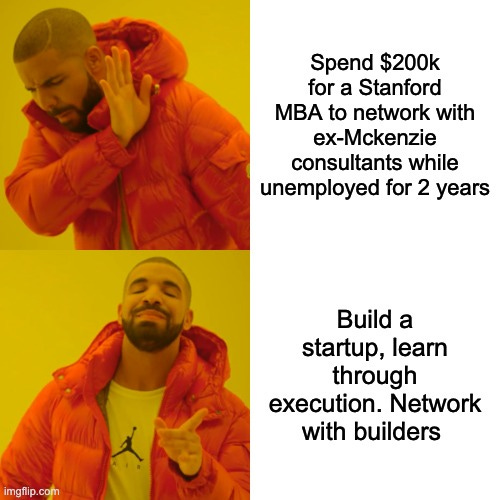A year ago, I quit my well-paying job at Uber as a senior software engineer. I was well on my path to a lucrative promotion and compensation bump. But instead, I left it all to pursue entrepreneurship, to build Bestever. The journey has been a rewarding one. People ask me what it’s like to quit a cushy job and what motivated me to do so. So this one-year mark feels like the ideal time to write about it.
Know Thyself
In late 2020, I knew I wanted to change my career. You can read more about my philosophy on career changes here.
I’d worked at big companies for years because I had enjoyed building at scale, but the slowness and the layers of bureaucracy start to grate on your soul. I distinctly remember a switch flipping in this hour-long meeting.

The reason builders get excited about software engineering in the first place is due to its ability to have an impact. We love drinking coffee, slinging code, and executing with urgency. Unfortunately, wasting time in “consensus-driving” meetings and promotion-driven engineering culture kills the joy of building. Here is an excerpt from my mental model from the time:
I listed out a few things that I thought were important to me. After looking at the matrix, it was clear that there was a higher likelihood of achieving career satisfaction working at a startup for me. I was worried about not having the scale and thrill of hundreds of thousands of users. But then, you can use it as a motivation to grow your company. I debated joining a startup as a founding team member or starting my own.
There are quite a few differences in the responsibilities of a founder compared to an early team member. The majority of successful founders thrive in most of these responsibilities. I wanted the experience of building a team from scratch, recruiting a world-class team, and building a solid network of builders and entrepreneurs around me.
Taking the leap of faith
Many talented people working at FAANG companies get complacent. They get too comfortable and never pull the trigger. Instead, they jump from one big company to another, waiting for a future when they have “enough money” to take risks.
News flash, there is no such thing as enough money. If you are serious about wanting to start your business, the sooner you start, the less disruptive the rest of your life will be. As you get older, the ugly truth is that you’ll have monthly mortgage payments, children to feed, and bills to pay. For most people, their burn rate increases with time.
Additionally, If you are a woman, your biological clock is ticking. You can work at a stable big company job at any point in your life. However, a startup career requires energy and resource allocation, which is hard to achieve as you grow older. Waiting to be financially stable to start a company is like saving sex for when you are old (to quote Buffet).
I grew up in an average middle-class Indian family with a financial scarcity mindset. It would have been unimaginable to take a monetary risk early in my career. But in the end, the economic scarcity mental model proved detrimental. People have more energy earlier in their careers and have fewer commitments. They rent, they have roommates, and they can survive on Redbull and pizza.
At 32, my burn rate is way higher than in my early 20s. I need a whole night’s sleep to be functional, and all-night coding sessions wreak havoc on my body. I wish I’d done this sooner. So if you are planning to start your own company one day, take that leap of faith sooner rather than later.
Working at a startup is worth 10x more than an MBA
Many people are put off by the “risk” of startups. They worry about startups failing. Yet, the same people won’t blink twice before dropping $200k on an MBA.
If you have never worked at a startup, you probably aren’t trained to think of problems around growth strategy, user acquisition, or building products 0-to-1. You join a company when there are already thousands of users. Millions of users might use your work, but you have no idea how they got there in the first place. The hustle needed to build something 0 to 1 is incredibly valuable in the valley (and in life).
Even if the startup is a complete bust, the skills you acquire will make you 10x more employable than if you stayed a cog in the big tech machine. It’s like getting an MBA with 10x the financial upside.
US visa and work permit hurdles
Being an immigrant is a massive hurdle for starting a company in the US. It is shameful how hard it is for intelligent entrepreneurs to immigrate here and start companies. The US is one of the few first-world countries not to have a dedicated startup founder visa. If you are already in the US considering starting your own company, talk to a good immigration lawyer.
However, In the recent few years, immigration has been a nightmare. I am not optimistic this is going to change anytime soon. However, the distributed world we live in now gives me hope. My team is spread across four time zones. Currently, I am the only person based in San Francisco! A few years ago, this would have been unimaginable. However, tech is starting to decentralize. You no longer need to be in the US to build a successful company. As Balaji points out here, 52% of unicorns are now based outside the US.


The Asian startup scene is thriving. I almost moved to Mexico City when I was having immigration issues myself. Having immigrants start successful businesses is a huge privilege. If you don’t feel valued in a country, the world is vast with many options. Talented builders should not be held hostage. Go to India, Mexico, Canada, or Portugal! Go to Bolivia if you have to. Just build! Silicon valley now exists in the metaverse, and your physical location doesn’t matter as much anymore.
Startup life is hardcore.
The hardest part about being a founder is managing your mental state. In a regular job, you have the privilege of compartmentalization. When you’re done, you get to turn it off. But as a founder, there is no off switch. Every user you fail to acquire, every feature you built wastefully, and every missed traction goal is your fault. Additionally, you have to work with budget constraints to ensure you can stretch your runway as far as you can.
This is probably the most stressful job I’ve ever had. However, what gets me through is energy, optimism & working with my incredibly competent team. We move fast. We break things (A little too much if you ask me). But, we’re learning from our mistakes, working our asses off.
It’s the most fulfilling job I’ve ever had. This career path is best suited to people with pure grit and tenacity. This is hardcore and not for the weak.
Small Plug:
Bestever is an e-commerce platform to discover indie products through video reviews. (Think of it as a TikTok meets Amazon). We’re always looking for talented people. Send me an email if you’d like to be a part of it.







Hi Apoorva, Many congratulations on your perseverance. I am glad that you managed to stay in the Silicon valley. Can you share some insights on how you managed to get your visa to stayback please? It could help several people undergoing the same struggle. Thank you very much Apoorva. I wish you a very good luck
Loved the idea and your execution of bestever. All the best